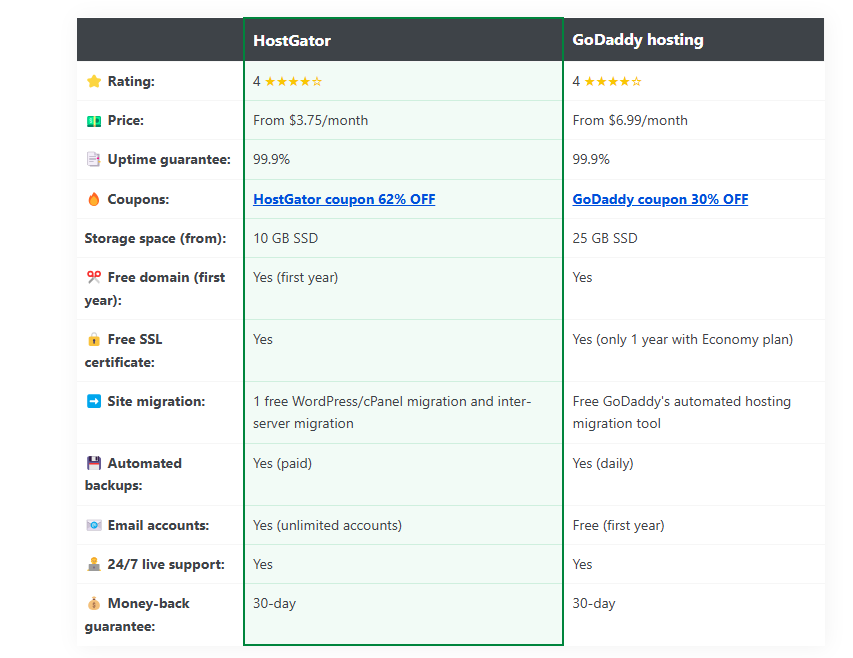HostGator and GoDaddy are two popular options for anyone starting a website. However, HostGator offers cheaper pricing and all-inclusive hosting packages. GoDaddy, on the other hand, is more expensive and oriented towards business users.

Performance:
- HostGator: Known for reliable uptime and decent loading speeds, HostGator offers solid performance for small to medium-sized websites. They have data centers in the U.S., which is beneficial for websites targeting a North American audience.
- GoDaddy: Also provides good uptime and performance, but some users report slower load times compared to HostGator. GoDaddy’s global data centers are an advantage for websites with an international audience.
2. Pricing:
- HostGator: Offers competitive pricing with a variety of plans that are often discounted for the first term. Their renewal prices can be higher, so it’s essential to factor in long-term costs.
- GoDaddy: Generally, GoDaddy’s pricing is slightly higher than HostGator’s, especially when it comes to renewals. However, they often include a free domain name with their hosting plans, which can be a plus.
3. Features:
- HostGator:
- Provides unlimited bandwidth and storage with most plans.
- Includes a free website builder, SSL certificates, and email accounts.
- Offers a 45-day money-back guarantee.
- cPanel-based control panel, making it easy for users to manage their sites.
- GoDaddy:
- Offers a wide range of hosting types, including shared, VPS, and dedicated hosting.
- Includes a free domain with annual plans and a website builder.
- Provides free Office 365 email for the first year.
- GoDaddy has a more extensive suite of services, including domain registration, marketing tools, and website security.
4. Customer Support:
- HostGator: Known for responsive customer support, available 24/7 via live chat, phone, and email. Their support is generally well-regarded, though some users may experience occasional wait times.
- GoDaddy: Offers 24/7 customer support via phone and live chat. However, GoDaddy’s support has mixed reviews, with some users praising it and others reporting less satisfactory experiences, particularly with more technical issues.
5. User Interface and Ease of Use:
- HostGator: Uses the industry-standard cPanel, which is user-friendly and widely known among webmasters. Their interface is straightforward, making it easy for beginners to manage their websites.
- GoDaddy: Has its custom control panel for managing hosting, which may have a steeper learning curve for users familiar with cPanel. However, they offer a simplified interface for beginners.
6. Additional Services:
- HostGator: Focuses primarily on web hosting but also offers domain registration and some marketing services. They provide a free migration service, which can be helpful if you’re moving from another host.
- GoDaddy: A more comprehensive service provider with extensive domain management, web hosting, marketing tools, and website security services. They also offer a wide range of other services, including SEO tools, email marketing, and online store management.
Conclusion:
- HostGator is often the better choice for those seeking reliable hosting with strong support at a competitive price, particularly for smaller websites or those in North America.
- GoDaddy may be more suitable for users who need a broader range of services, especially if they require extensive domain management, global performance, or additional business tools. However, it may come at a higher cost.